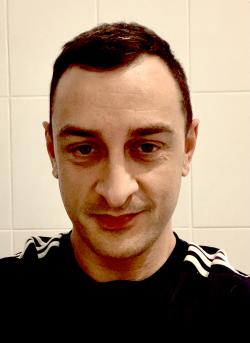Meet world-leading behaviour and social change scholar Professor Ross Gordon. Ross joins UTS Business School as Professor of Behaviour and Social Change to lead and develop research initiatives tackling some of society’s most challenging social issues.

UTS Business School welcomes interdisciplinary social change activist Professor Ross Gordon, widely regarded as one of the world’s leading experts in using social marketing and social science methods to achieve behaviour and social change and generate transformative social impact across a diverse range of areas including gambling, energy, climate change and environmental sustainability, alcohol and tobacco consumption, public health, mental health and workplace bullying.
Ross has worked extensively with policymakers, government and sector bodies to design, implement and evaluate innovative behaviour and social change programs to address some of society’s most significant societal challenges.
“Ross’s work to drive sustainable behavioural change across a broad spectrum of important social, economic and public health issues – such as addressing the harm of gambling and risks of adolescent alcohol consumption, leveraging behavioural change insights to increase global COVID-19 vaccine uptake, as well as helping some of our most vulnerable communities in making more empowered energy choices – is contributing to meaningful change for thousands of households in Australia and across the globe,” says Professor Carl Rhodes, Dean of UTS Business School.
“We look forward to Ross continuing this invaluable work at UTS Business School in support of the School’s commitment to developing and sharing knowledge for an innovative, sustainable and prosperous economy in a fairer world.”
Ross has been a principal or named investigator on numerous research projects attracting over AU$8.4m in research funds in Australia, the UK, Europe and Asia, including most recently as Lead Chief Investigator on a new project ‘Australian consumer’s perceptions, barriers, motivators, and behaviours concerning electric vehicles’ as part of the Australia’s Reliable, Affordable, Clean Energy for 2023 (RACE for 2023) Cooperative Research Centre, as well as lead of an Australian Research Council Discovery Grant for research project ‘In it to win it: An interdisciplinary investigation of sports betting’ which combined consumer ethnography & neuroscience to understand sports gambling behaviours & pathways to reduce harm.
Ross currently serves on the World Health Organization (WHO) Technical Advisory Group on Behavioural Insights and Sciences for Health where he has helped develop frameworks and guidelines and provided expert advice to inform public health behaviour change interventions around the world – including COVID vaccine uptake and addressing non-communicable diseases such as diabetes and hypertension.
I can feel the energy here at UTS Business School to work on issues that generate positive social impact, and which makes us rethink what business schools are for.
He has also worked closely with Australia’s Federal and State Governments, the UK and Scottish Governments, the European Commission, World Health Organization, Energy Consumers Australia, NSW Health and a broad range of corporate and sector organisations, leveraging his expertise in interdisciplinary and multi-method approaches and extensive experience using methodologies including longitudinal quantitative surveys, systematic reviews and meta-analyses, focus groups, depth interviews, ethnography including visual methods, content analysis, and cognitive neuroscience.
Ross is also co-author of the influential book Strategic Social Marketing: For Behaviour and Social Change, highlighting the importance of social marketing as an integral component of all social program design and delivery when looking to achieve social good.
Ross joins the Business School from Queensland University of Technology, where he held the role of Professor in the School of Advertising, Marketing and Public Relations. Ross has held honorary and visiting positions at the London School of Economics and Political Science, The Open University and Coventry University. He is also former President of the Australian Association of Social Marketing (2014-2021), the national peak body representing social marketing for behaviour and social change, and former member of the Board of Directors of the International Social Marketing Association (2015-20).
What excites you about your new role as Professor of Behaviour and Social Change?
Ross: I’m excited for the opportunity to come to UTS and to a Business School that is committed to making a contribution to address complex health and social problems such as climate change, gambling harm, non-communicable diseases, and inequality. As a proud Scot and a Glaswegian, I saw a lot of health and social issues growing up and always wanted to do something about it.
I can feel the energy here at UTS Business School to work on issues that generate positive social impact, and which makes us rethink what business schools are for. I also welcome the opportunity to lead and develop research in Transdisciplinary Behaviour and Social Change, and to work with people across UTS and our communities to deliver social good.
What inspired you to pursue the field of social marketing, and when did you come to realise its transformative impact in relation to influencing social change?
Ross: I fell into social marketing by accident really. My Undergraduate degree was in Politics and History, and then after travelling for 18 months I enrolled in an MSc in Public Policy. Before I started the MSc a colleague mentioned a summer job opportunity working with the Institute for Social Marketing at the University of Strathclyde to me and I applied. I did some research on the impact of alcohol marketing on children, the Institute seemed to like the work I was doing, and they hired me after I finished my MSc when they moved to the University of Stirling. From there I did a PhD and sort of became a social marketer.
From working at the Institute for Social Marketing I could immediately see how social marketing can influence behaviour and social change. I was exposed to high quality work that evidenced and critiqued the harms that alcohol, tobacco or food marketing does to children and led to policy and regulatory change. I also learned how effective social marketing programs could change behaviours to increase physical activity or encourage recycling. From there, I realised that this might be a good area to work in.
Your work has spanned a highly diverse range of social issues – from gambling to energy consumption to perceptions of COVID-19 prevention measures – and with a range of global organisations. What is one of your career highlights/projects that you are most proud of?
Ross: My focus tends to be on making an impact with real people and in our communities and less on personal gongs. One highlight I remember was from a community energy efficiency program called Energy+Illawarra to support older lower income people we ran in regional NSW. One of the project participants sent me a personal thank you letter and outlined how she had learned so much about how to save on her energy costs while maintain comfort and well-being and that the project had made a big difference to her. To me that is real impact and why we should be doing the job.
I suppose on a more traditional sense, being asked to serve on the World Health Organization (WHO) Technical Advisory Group on Behavioural Insights and Sciences for Health is a highlight and I have also learned a lot in this role from working with other experts to improve public health through behaviour change.
How do you anticipate the field of social marketing evolving in future?
Ross: There is a need to adopt transdisciplinary approaches to solve complex social problems. One approach, such as social marketing is not enough. We need people to work together across disciplines, sectors, backgrounds and positionalities to achieve meaningful change. It can be difficult, and in many domains hard science and technical approaches dominate, or we see people from diverse ethnic, cultural, gender, economic and geographic backgrounds being excluded. This must change, and I hope social marketing can evolve with these issues in mind into the future.
Do you have any advice for early career researchers starting out in their research careers?
Ross: It is really difficult for early career researchers (ECRs) right now and I feel the sector needs to do a lot more to address this. There are very few job opportunities, the performance expectations are crazy high, and the demands of the job and workloads are intense.
I used to run an ECR program at QUT and some advice we used to offer was to try to do as much possible to stick to your values rather than just simply doing whatever people say will get you ahead. I also think it’s important to understand the power dynamics and the politics of academia and how that shapes your experiences as an ECR and beyond.
The best advice I was given as an ECR was from Vale Professor Don Iverson when he was DVC Health at the University of Wollongong. He told me that the most important thing is to find and work with good people and focus on that rather than institutions – which he pointed out are ultimately socially constructed. So, I try to find good people to work with and where we share similar values and that has helped me.
Many young people have a healthy scepticism of marketing from brands and organisations. What advice would you give to students who are interested in pursuing a career in marketing or social marketing, and what skills do you think are most important for success in this field?
Ross: I share the scepticism that many young people have of brands and organisations. Recent years have highlighted some of the major flaws in neoliberal capitalism and I can understand why young people are questioning things. My advice to students is to understand the importance of critical thinking and questioning why things are the way they are and how things could improve. For those in mainstream marketing this could involve focusing on how to avoid harm, or how to generate positive social impact from your actions. And I think social marketing is a great example of how marketing is not always something that can be bad – but it can be harnessed to effect positive change. So critical thinking, asking questions, facilitating inclusive reflexive dialogue, and solving problems are key skills that I see as important.


